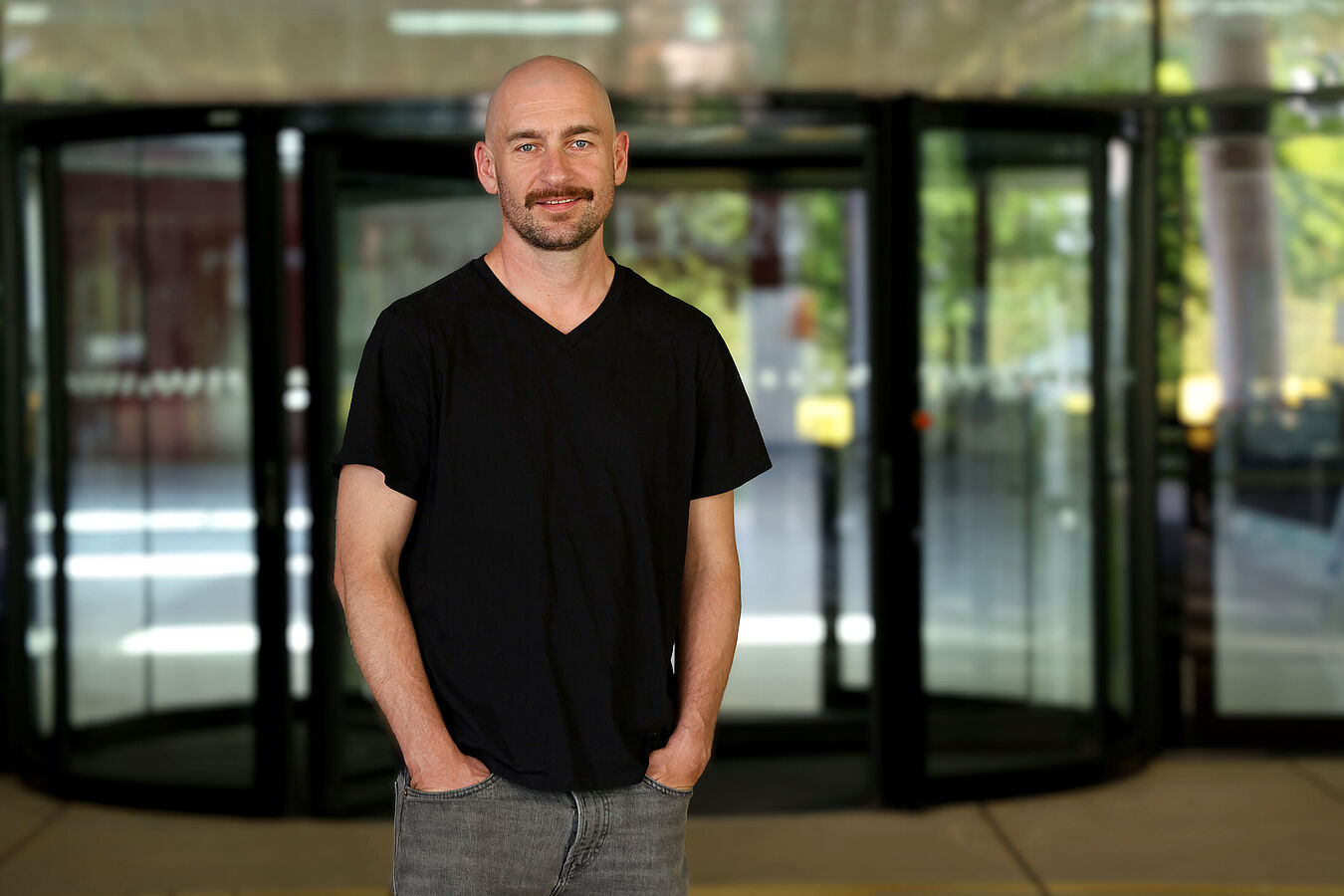The Austrian native spent seven years at the Leibniz-Forschungsinstitut für Molekulare Pharmakologie (FMP) as a postdoc in the working group of Prof. Dr. Volker Haucke. In June 2025, Ebner moved to the Medical University of Innsbruck to establish his own research team at the Institute of Molecular Biochemistry (IMB).
In his research, Ebner focuses on lysosomes. Lysosomes are the central degradative organelles of all cells and act as logistical hubs of cellular metabolism—like small “recycling” factories. They help convert components from food as well as macromolecules obtained through autophagy into nutrients. A combination of genetic risk factors, environmental influences, and the accumulation of metabolic products inside the lysosome (lumen) leads to the build-up of dysfunctional lysosomes. This results in rare genetic dementia diseases in childhood (e.g., Batten disease), neurodegeneration, aging processes, and metabolic syndromes, making it relevant to an ever-growing portion of the population.
Focus on lipids and microglia cells
In particular, lipids and their degradation products are responsible for the dysfunction of lysosomes and neurodegeneration. However, the molecular mechanisms that regulate the lipid flow through lysosomes are only partially understood. This is exactly where Michael Ebner and his team step in: with their research, they aim to close fundamental gaps in knowledge about “lysosomal lipid logistics” and clarify their role in neurodegeneration. “To do this, we utilize cutting-edge imaging techniques, omics methods, compound screenings, and biochemical approaches,” says Ebner. They focus particularly on special immune cells in the brain, so-called microglia. An important aspect is that microglia are often overactive and promote chronic inflammation in the brain. Lipid pathways in the lysosomes play a significant role in the activation of inflammatory signals.
Specifically, Michael Ebner and his Innsbruck team want to focus on the molecular mechanisms in the areas of membrane repair, membrane biogenesis, the export of lipids and metabolites, and their impact on proinflammatory signaling pathways in microglia. Methodologically, Michael Ebner will mainly work with cell cultures and microscopic methods. In addition, the project “lysosomal lipid logistics,” or LysoLogs for short, includes a high-throughput compound screen that Ebner will continue to carry out at the Leibniz-FMP in Berlin.
“Our overarching goal is to use our findings to specifically modulate the discovered signaling pathways and thus improve the health of lysosomes. In this way, we hope to help alleviate symptoms in rare childhood dementia diseases and other brain disorders. The ERC Grant is a fantastic opportunity to do exactly that,” says the ERC awardee.
About Michael Ebner
Michael Ebner obtained his doctorate in molecular biology at the University of Vienna. In 2017, he came to Berlin to the Leibniz Research Institute for Molecular Pharmacology, where he worked as a postdoc in the lab of Prof. Dr. Volker Haucke for seven years. Since June 2025, he has been a group leader at the Institute of Molecular Biochemistry at the Medical University of Innsbruck.
About the ERC Starting Grant
The ERC Starting Grant is a prestigious funding instrument of the European Research Council (ERC), a European Union body for the support of excellent basic research. The Starting Grant supports outstanding early-career researchers whose doctorate dates back two to seven years. Particularly innovative, independent research projects in any field are funded, with up to 1.5 million euros provided for up to five years. The aim is to enable recipients to build their own research team at a European host institution. The sole criterion for selection is the scientific excellence of the applicant and the project idea.
About the FMP:
Das Leibniz-Forschungsinstitut für Molekulare Pharmakologie (FMP) erforscht biochemische Abläufe im Körper und molekulare Ursachen von Krankheiten. Auf der Basis dieser Erkenntnisse suchen Wissenschaftler und Wissenschaftlerinnen dann gezielt nach Wirkstoffen und schaffen damit die Grundlagen der Medizin von morgen. Interdisziplinäre Teams aus den Bereichen Biochemie, Chemie, Physik, Pharmakologie und Medizin arbeiten auf dem Campus Berlin-Buch in einem einzigartigen Arbeitsumfeld zusammen. Das FMP gehört zum Forschungsverbund Berlin e.V. (FVB), einem Zusammenschluss von sieben natur-, lebens- und umweltwissenschaftlichen Instituten in Berlin.


